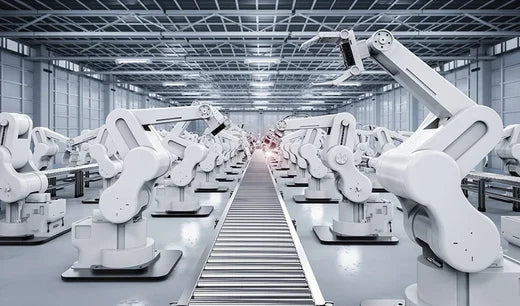
The Future of Industrial Robot Market: Efficiency, Precision, and Sustainability
Share

Introduction
In the fast-paced world of modern manufacturing, industrial robots are reshaping the landscape. These programmable machines are designed to execute tasks with unmatched precision, speed, and reliability. Serving as the backbone of industries such as automotive, electronics, aerospace, and pharmaceuticals, industrial robots have proven their worth by increasing productivity, enhancing product quality, and driving cost efficiency. Whether working autonomously or under human supervision, industrial robots are essential components of modern manufacturing processes and are poised to play a key role in the future of industrial automation.
As the demand for more efficient, cost-effective, and sustainable production processes rises, the evolution of industrial robotics continues to accelerate. To understand the trajectory of this revolution, it is important to explore the critical advancements and trends that are driving the growth of this market.
Fleet Management: Streamlining Operations and Enhancing Efficiency
One of the most critical developments in industrial robotics is the rise of fleet management. This involves the centralized control and supervision of a group of robots working within manufacturing or industrial environments. The goal is to optimize the entire robot fleet, ensuring peak efficiency and minimal downtime.
Fleet management encompasses several essential tasks, including coordinating robot deployment, scheduling operations, monitoring performance, and conducting proactive maintenance. By centralizing control, manufacturers can not only enhance productivity but also drive cost savings and improve reliability across the entire robotic system. For investors, fleet management solutions represent a rapidly growing sector with immense potential for improving operational efficiency and lowering overhead costs within manufacturing processes.
Advanced Sensors and 3D Vision Systems: Redefining Precision and Adaptability
As the robotics industry evolves, so too do the capabilities of the machines themselves. Manufacturers are integrating increasingly sophisticated sensors and vision systems into their robotic platforms, transforming the way robots interact with their environments.
The introduction of advanced sensors and 3D vision systems is enabling robots to perceive their surroundings with unparalleled precision. Robots can now navigate complex tasks with enhanced spatial awareness and adaptability, allowing them to handle everything from assembly line operations to more intricate tasks such as quality control and inspection. These advancements are driving robots to higher levels of efficiency and accuracy, positioning them as indispensable tools in modern manufacturing.
For investors, these cutting-edge capabilities open up new opportunities in sectors ranging from electronics and automotive to pharmaceuticals and healthcare, where precision and adaptability are paramount.
AI and Machine Learning: Empowering Autonomous Decision-Making
Artificial intelligence (AI) and machine learning are playing an increasingly pivotal role in transforming industrial robotics. The integration of AI allows robots to learn from past data, continuously improving their performance and enhancing their decision-making capabilities. This includes everything from predictive maintenance to autonomous decision-making in real-time production environments.
AI-driven robots can detect potential issues before they become critical, reducing downtime and minimizing maintenance costs. For example, AI-powered systems can predict when a robot is likely to need repairs, allowing manufacturers to proactively address potential failures. Companies such as Teradyne Robotics, the parent company of Universal Robots (UR) and Mobile Industrial Robots (MiR), are already working with Nvidia to integrate AI capabilities, setting the stage for smarter, more autonomous robots.
This development offers significant growth potential for investors looking to tap into the intersection of AI and industrial robotics, as companies strive to build more intelligent, self-optimizing machines.
Energy Efficiency and Sustainability: The Green Revolution in Robotics
As global industries face mounting pressure to become more energy-efficient and environmentally responsible, the robotics sector is rising to the challenge. Manufacturers are designing robots with improved energy management systems and using eco-friendly materials to minimize their environmental footprint.
ABB Robotics, a global leader in industrial automation, is expanding its robot range with new energy-efficient models. By focusing on sustainability, companies are ensuring that their robots not only optimize production but also align with global efforts to reduce energy consumption and environmental impact.
This growing emphasis on energy-efficient and sustainable robotic solutions presents attractive investment opportunities for those looking to support the shift toward greener, more sustainable industrial operations. In an age where sustainability is increasingly becoming a top priority, these eco-friendly robots are poised for significant growth.
IoT Integration: Unlocking Real-Time Data and Insights
The integration of the Internet of Things (IoT) with industrial robots is creating a transformative shift in manufacturing. By connecting robots to the IoT ecosystem, manufacturers gain access to real-time data, enabling them to remotely monitor performance, conduct analytics, and track production efficiency with ease.
Connected robots are providing unprecedented levels of operational visibility and insight. Manufacturers can now collect and analyze data on robot performance, maintenance schedules, and production trends, which empowers them to make more informed decisions. This connectivity also allows for seamless remote monitoring and control, further enhancing the flexibility and efficiency of manufacturing processes.
For investors, IoT-enabled industrial robots present a high-growth area with vast potential. As factories become more connected and data-driven, the demand for IoT-integrated robots will only continue to rise, providing new opportunities for businesses to scale their operations and optimize production.
Conclusion: A Growing Market with Immense Potential
From fleet management and AI-driven predictive maintenance to the integration of advanced sensors and IoT technologies, industrial robots are evolving at an exponential rate, offering vast potential for improving productivity and innovation across multiple industries. With their ability to increase efficiency, reduce costs, and contribute to sustainable manufacturing practices, robots are setting the stage for the next wave of industrial transformation.
For investors, the continued evolution of industrial robotics represents an exciting opportunity to capitalize on a market that is expanding rapidly. As these technologies advance and become more integrated into manufacturing processes, industrial robots are set to play an even more prominent role in shaping the future of global industries.